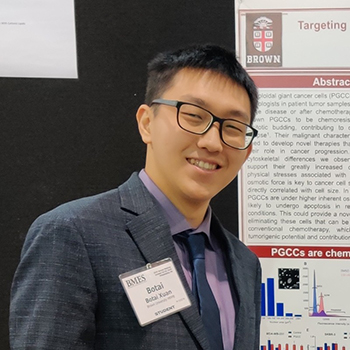 Xuan is recognized for his innovative and significant work and deep knowledge across multiple research areas, including cell biophysics, cancer and stem cell biology, image processing, and statistics. He completed his doctoral degree in Molecular Pharmacology and Physiology in December of 2020. This prize recognizes the superior research achievements of doctoral students.
Xuan is recognized for his innovative and significant work and deep knowledge across multiple research areas, including cell biophysics, cancer and stem cell biology, image processing, and statistics. He completed his doctoral degree in Molecular Pharmacology and Physiology in December of 2020. This prize recognizes the superior research achievements of doctoral students.
Xuan’s dissertation titled, Unraveling the Contributions of Polyploidal Giant Cancer Cells in Cancer Progression, focuses on an understudied population of giant cancer cells that contributes to disease progression and chemoresistance.
Xuan observed that the proportion of giant cells increased when treated with chemotherapeutic drugs or media from senescent stromal cells. This initial research led to the development of a new project, which is now a major focus in Michelle Dawson’s lab. Dawson is an Assistant Professor of Medical Science in the Department of Molecular Pharmacology, Physiology and Biotechnology.
Polyploidal giant cancer cells are multi-nucleated drug resistant cancer cells that have been largely overlooked due to their small numbers and because they are not capable of normal cell division. The cells are highly resistant to chemotherapeutic agents, but they can undergo
budding to form new cancer cells after treatment. Xuan’s studies were the first to show that the giant cancer cells have unique properties and persistent migration, which allows them to behave like invasive cancer cells.
He “presented an extremely polished dissertation. His document was well-organized and included publication quality results throughout,” shares John M. Sedivy, Hermon C. Bumpus Professor of Biology and Professor of Medical Science and Director of the Center on the Biology of Aging.
Xuan also developed new approaches to solve quantitative research problems more efficiently. Dawson shares that he created new automated pipelines for processing and analyzing images and performing statistical analysis on large numbers of samples more quickly, which provided him even more time to do additional research. His nominators note that the amount of work he was able to complete during his time is exceptional for his field.
Xuan has presented his research at multiple national conferences. He has already published his work in PNAS, Scientific Reports, and Journal of Cell Science. Additionally, his Scientific Reports paper was chosen for their ‘Top 100 in Cell and Molecular Biology’. He also has plans to publish additional papers based on his dissertation research.
“This award means a great deal to me. The dissertation and my PhD as a whole is the cumulative result of years of work. The task of studying a novel area is always a risk, and I am extremely thankful it worked out in such a big way. I am grateful for the support of my lab, PI and peers. I am very happy I was able to succeed, and make my mentors and parents proud,” says Xuan.
Xuan is currently in a scientist role at Izon Science, a company focused on nanoparticle and extracellular vesicle isolation and characterization, based near Boston.
Read more about the other Joukowsky Prize winners.